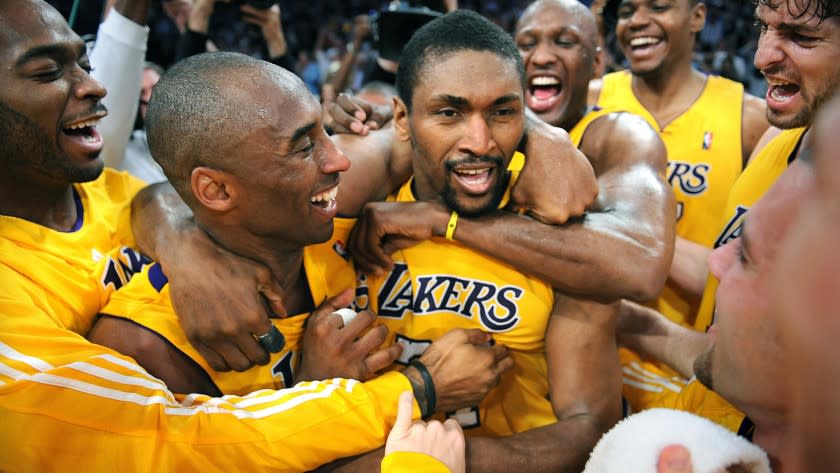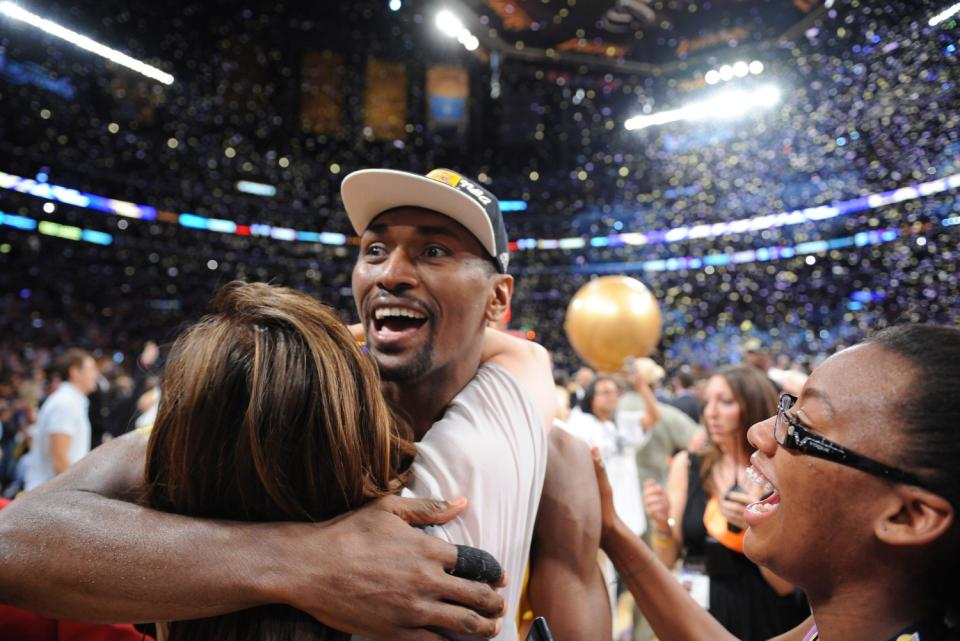When still Ron Artest, Metta World Peace gave Lakers therapeutic ending to 2010 NBA Finals

Seventh in a series about the 2009-10 Lakers.
“I got Wheaties!” bellowed the man whose name was Ron Artest, grinning gleefully as people present for the news conference giggled in their seats on June 17, 2010.
“Y’all don’t seem excited. I’m all excited,” he said after the Lakers beat the Boston Celtics 83-79 in Game 7 of the NBA Finals at Staples Center, still grinning. “I feel like the oddball!”
Artest brought his kids, his parents, his wife, a niece and a nephew, and his brother on stage. And what everyone remembers more than anything is that he thanked his therapist, Dr. Santhi Periasamy.
At the time, it was considered another wacky moment in this supposed oddball’s public history, and it was treated as such. Artest, who changed his name to Metta World Peace in 2011, knew some would make fun of him when he said it, but he also knew it would help.
“People were like, ‘Oh, Ron thanked his psychiatrist. He’s crazy,' " World Peace recalled recently. “… What do you mean I’m crazy? That’s why people don’t come out. That’s why people don’t say they have issues. Forty million people watched that game. If you get one person calling you crazy, that’s enough. Especially a kid. If you get millions of people, that’s worse.
“Who wants to go out and be vulnerable? Nobody. But me.”
In the decade since, the conversation about athletes’ mental health has changed dramatically. High-profile NBA players such as Kevin Love and DeMar DeRozan have spoken publicly about their struggles with anxiety and depression. NBA Commissioner Adam Silver addresses players’ mental states in more compassionate ways than officials of his stature had in the past.
And during that time, World Peace has become an ambassador for mental health issues through speaking engagements, advocacy and a revealing documentary released in 2019 about his struggles with anger and medication and the path toward inner peace he had worked to carve for his entire life.
“Any time you see someone in the public, whether it’s an actor or sports player … if they’re open about that, it really reduces the stigma and allows people to act on something that they’ve been contemplating,” Periasamy said in a recent interview.
Therapy helped him cope with anger he felt, and he made sure to keep appointments with Periasamy during the 2010 Finals.
“Any time I get to these moments of success, it’s always something else,” World Peace recalled. “I’m not thinking about having fun. I’m more thinking about, it’s going to be some drama. … I was really worried I was going to get suspended or get a tech during crucial times.”

It had happened plenty of times before. His most infamous moment came during an incident in Detroit when Artest entered the stands to find a fan who had thrown something at him during an on-court brawl that spilled into the stands. More recently, he had been ejected in consecutive games during a 2009 playoff series against the Lakers while playing with the Houston Rockets.
To keep his focus where he needed it to be, World Peace said he spoke with Periasamy the afternoon of Game 7 before his pregame nap. Then he was a star in the game.
He scored 20 points — more than any player except Kobe Bryant — with five steals and five rebounds. He hit a three-pointer with 1:01 left that gave the Lakers a six-point lead. It was a shot no Lakers sympathizer in the building wanted him to take except, perhaps grudgingly, Bryant, who passed him the ball.
Then Artest celebrated with champagne and a series of interviews in which he happily thanked “Dr. Santhi.”
“I was shocked and grateful and more happy for my client and just everything that happened,” said Periasamy, who only heard the next day that he had thanked her. “I’m not somebody who was seeking out any type of public acknowledgment. … I’m a therapist. I’m not used to that happening.”
Then it was time for the forward to address the rest of the assembled media — except NBA officials didn’t want that. The league thought of him as a loose cannon and didn’t know what he might say on the podium in an interview that was to be broadcast live.
“They were scared to death to take him in the press conference room,” said John Black, who was then the Lakers’ vice president of public relations. “But I was like, this guy is pretty much the star of the game, he hit that huge shot, this was his moment of glory.”
At the podium, he displayed some of the fun-loving goofiness many had come to appreciate. But he also talked about his struggles in big moments and how Periasamy had helped him.
People thank him for that often.
“I got calls from NBA players too that reached out to me that I would never say their names because they never asked me to,” World Peace said. “It was amazing that people felt they could talk.”
It all started because he did — first.
Tomorrow: After the Lakers' three-peat attempt was derailed by the Mavericks, Phil Jackson departed and another rebuild was on the horizon.

